Introduction
Dealing with a tooth infection can be a painful and uncomfortable experience. While it is essential to seek dental treatment as soon as possible, you may also be wondering if the infection can spread and cause further complications. In this article, we will explore the signs and symptoms of a spreading tooth infection and provide you with information on how to prevent it from worsening.
Table of Contents
- What is a tooth infection?
- Signs and symptoms of a spreading tooth infection
- Complications of a spreading tooth infection
- Preventing the spread of a tooth infection
- When to seek dental treatment
- FAQs
- Conclusion
What is a tooth infection?
A tooth infection, also known as a dental abscess, occurs when bacteria enter the innermost part of the tooth, called the pulp. This can happen due to tooth decay, a cracked tooth, or gum disease. When the bacteria multiply, an abscess forms, leading to pain, swelling, and potential complications.
Signs and symptoms of a spreading tooth infection
A spreading tooth infection can cause various symptoms throughout your body. It is important to pay attention to these signs to prevent the infection from worsening. Here are some common signs and symptoms:
- Severe tooth pain that radiates to the jaw, ear, or neck
- Swelling of the face, gums, or lymph nodes
- Fever and chills
- Difficulty opening your mouth or swallowing
- Bad breath or a foul taste in your mouth
- Generalized fatigue or feeling unwell
If you experience any of these symptoms, it is crucial to seek dental treatment promptly. Ignoring a spreading tooth infection can lead to serious complications.
Complications of a spreading tooth infection
When a tooth infection spreads, it can lead to severe complications that can affect your overall health. Some possible complications include:
- Cellulitis: The infection can spread to the surrounding tissues, causing redness, swelling, and pain.
- Facial or neck abscess: The infection can form an abscess in the face or neck, potentially requiring surgical drainage.
- Septicemia: In rare cases, the infection can enter the bloodstream, leading to a condition called septicemia or blood poisoning.
- Osteomyelitis: The infection can spread to the jawbone, causing bone damage and potentially requiring extensive treatment.
These complications highlight the importance of seeking prompt dental treatment and preventing the spread of a tooth infection.
Preventing the spread of a tooth infection
To prevent a tooth infection from spreading, it is crucial to take immediate action. Here are some steps you can take:
- Seek dental treatment: Schedule an appointment with your dentist as soon as you notice any signs of a tooth infection. They can diagnose the infection and recommend the appropriate treatment, such as antibiotics or a root canal.
- Maintain good oral hygiene: Brush your teeth twice a day, floss daily, and use an antiseptic mouthwash to reduce the risk of infection.
- Avoid hot or cold foods and drinks: Temperature extremes can aggravate tooth sensitivity and pain.
- Avoid chewing on the affected tooth: Putting pressure on the infected tooth can worsen the infection and spread it to other teeth.
- Follow your dentist’s instructions: Take any prescribed medications as directed and attend follow-up appointments to ensure proper healing.
By following these preventive measures, you can minimize the risk of a spreading tooth infection and protect your oral and overall health.
When to seek dental treatment
If you suspect you have a tooth infection or notice any signs of spreading, it is essential to seek dental treatment immediately. Dental professionals have the expertise to diagnose and treat tooth infections effectively. Delaying treatment can lead to severe complications and further spread of the infection.
FAQs
Q: Can a tooth infection spread to other parts of the body?
A: Yes, a spreading tooth infection can potentially spread to other parts of the body, leading to serious complications. It is essential to seek dental treatment promptly to prevent the infection from worsening.
Q: Can a tooth infection go away on its own?
A: While the symptoms of a tooth infection may temporarily subside, the infection itself will not go away without proper treatment. Dental intervention is necessary to eliminate the infection and prevent further complications.
Q: How long does it take for a tooth infection to spread?
A: The spread of a tooth infection can vary depending on various factors, including the individual’s immune system and the severity of the infection. It is best not to wait and seek dental treatment as soon as possible to prevent the infection from spreading.
Conclusion
A spreading tooth infection can cause severe pain and lead to complications that can impact your overall health. It is crucial to recognize the signs and symptoms of a spreading tooth infection and seek dental treatment promptly. By taking immediate action and following preventive measures, you can prevent the spread of a tooth infection and protect your oral and overall well-being.




